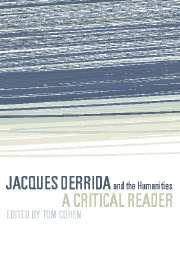Book contents
- Frontmatter
- Contents
- Preface
- Acknowledgements
- Biographical chronology
- Introduction: Derrida and the future of …
- Chapter 1 The future of the profession or the university without condition (thanks to the “Humanities,” what could take place tomorrow)
- Chapter 2 Derrida and literature
- Chapter 3 Derrida and gender: the other sexual difference
- Chapter 4 Derrida and aesthetics: Lemming (reframing the abyss)
- Chapter 5 Derrida and representation: mimesis, presentation, and representation
- Chapter 6 Derrida and philosophy: acts of engagement
- Chapter 7 Derrida and ethics: hospitable thought
- Chapter 8 Derrida and politics
- Chapter 9 Derrida and law: legitimate fictions
- Chapter 10 Derrida and technology: fidelity at the limits of deconstruction and the prosthesis of faith
- Chapter 11 Derrida and history: some questions Derrida pursues in his early writings
- Chapter 12 Derrida and psychoanalysis: desistantial psychoanalysis
- Glossary
- Index
- References
Chapter 4 - Derrida and aesthetics: Lemming (reframing the abyss)
Published online by Cambridge University Press: 22 September 2009
- Frontmatter
- Contents
- Preface
- Acknowledgements
- Biographical chronology
- Introduction: Derrida and the future of …
- Chapter 1 The future of the profession or the university without condition (thanks to the “Humanities,” what could take place tomorrow)
- Chapter 2 Derrida and literature
- Chapter 3 Derrida and gender: the other sexual difference
- Chapter 4 Derrida and aesthetics: Lemming (reframing the abyss)
- Chapter 5 Derrida and representation: mimesis, presentation, and representation
- Chapter 6 Derrida and philosophy: acts of engagement
- Chapter 7 Derrida and ethics: hospitable thought
- Chapter 8 Derrida and politics
- Chapter 9 Derrida and law: legitimate fictions
- Chapter 10 Derrida and technology: fidelity at the limits of deconstruction and the prosthesis of faith
- Chapter 11 Derrida and history: some questions Derrida pursues in his early writings
- Chapter 12 Derrida and psychoanalysis: desistantial psychoanalysis
- Glossary
- Index
- References
Summary
A discussion of Derrida's treatment of the aesthetic as developed in The Truth in Painting, referring specifically to Kant's Third Critique, is not the place for the manner of facile narrative abandon that comes with a personal reminiscence. Such a story would, I suppose, need to be kept outside of and apart from the subject here. Even though, remaining completely cut off from any other purpose, it might, in Kant's terms, display the beauty he calls that of a “mere formal finality.” It is, however, hard to imagine a narrative that would be “estimated on the ground of … a finality apart from an end,” some story that would come to be in being excised, at one fell swoop, with no blood or trace of its rupture, like his impossibly neatly cut tulip (Critique, 80n; cf. TIP, 82–95).
- Type
- Chapter
- Information
- Jacques Derrida and the HumanitiesA Critical Reader, pp. 108 - 131Publisher: Cambridge University PressPrint publication year: 2002



